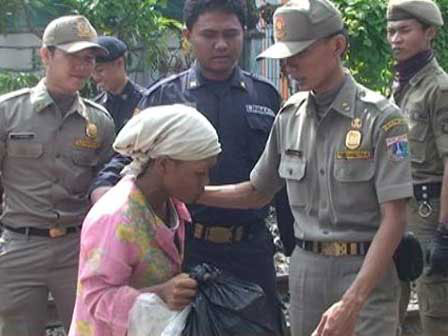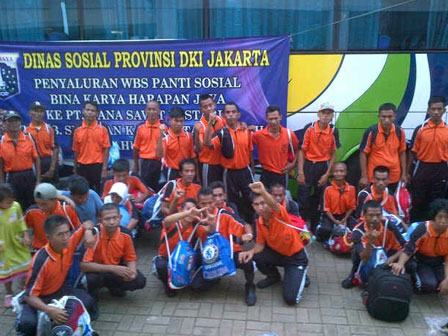PMKS Anticipation, Social Department to Deploy 160 Social Volunteers
Reported by Nurito | Translated by Anisah Mardhatilla
It has become a sort of tradition that prior to holy month of Ramadhan the capital city is always flooded with homeless people and beggars. To anticipate those people with social problems (PMKS), Jakarta Social Department is going to deploy 160 Service, Supervision, and Control (P3S) officers to be placed in 15 areas prone to PMKS presence in five municipalities.
They are assigned to give socialization and motivation to the PMKS not to conduct their activities on the streets and other public places
The 15 critical points of PMKS trafficking are intersections in Senen, Galur, Cempaka Putih, Kelapa Gading, Pramuka, Matraman, Taman Mini Indonesia Indah (TMII), Pasar Rebo, Trakindo (Cilandak), Fatmawati, Pejaten, Pancoran, Mampang Prapatan, Pemuda Monument (Senayan), and Slipi.
Wearing blue vest written ‘Relawan Sosial Dinas Sosial DKI Jakarta’ (Jakarta Social Department Social Volunteers), P3S officers will work in two shifts. The first shift will work at 7 AM until 3 PM, while the second shift starts at 3 PM until 11 PM. The netted PMKS will be brought to social institutions using caged vehicles. In the social institutions, they will be guided for 3-6 months before finally sent home to their respective hometowns.
Towards Ramadan, 33 PMKSs NettedHead of Jakarta Social Department Derelict Rehabilitation Section, Prayitno, said the social volunteers are deliberately deployed to accelerate PMKS handling from city streets. Each PMKS prone location will be guarded by 10 P3S officers. But especially for Pasar Rebo and Coca-Cola intersections which are quite wide, the locations will be guarded by 15 officers.
“They are assigned to give socialization and motivation to the PMKS not to conduct their activities on the streets and other public places,” he stated, Monday (6/9).
According to Prayitno, P3S officers will also give understanding to the citizens not to give money, food, or and others to PMKS on the streets since it would only increase the number of PMKS in the city. if the citizens wanted to give alms, they are urged to distribute it to official institutions, mosques, or orphanages.



